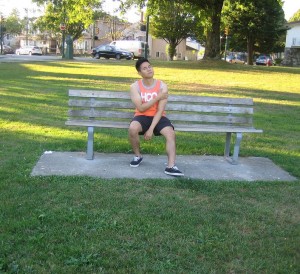The rotator cuff is a group of tough and flexible fibers or tendons and muscles found in the shoulders. Rotator cuff disorders happen when the tissues found in the shoulders gets irritated or damaged such as the following:
- Tendinitis or bursitis which is an inflammation of the tendons or bursa. A bursa is small sac that is filled with fluid that functions as a cushion between the tendons and the bones.
- An impingement where the tendon is being squeezed and rubbed against a bone.
- Calcific tendinitis which is the buildup of calcium in the tendons and very painful.
- A partial or complete tearing of the rotator cuff tendons

Causes
Using the shoulders for many years will slowly cause damage to the rotator cuff. As the person ages, some activities causes changes in the rotator cuff, like thinning and wearing of the tendons and the supply of blood is reduced.
Activities that use the arms above the head like playing tennis, swimming, or house painting can cause problems on the rotator cuff. Normal motions made over a long period can stress the rotator cuff.
An accident, severe fall or even a simple movement like lifting an object can cause a rotator cuff tearing in an older adult or anybody whose shoulder is already damaged.
People with rotator cuff disorders can experience pain and weakness in the shoulder, usually on the side and front of the upper arm and shoulders. It causes pain when doing everyday things like combing the hair or tucking on a shirt and there is difficulty falling asleep.
Symptoms of rotator cuff disorders
Tendinitis
- The shoulders and arms are not weak, but there is pain when using them.
- The pain spreads down the outside part of the upper arm and to the elbow.
- There is difficulty sleeping at night because the pain is worse during night time.
- When lifting the arms to the front and to the sides, it causes pain.
Rotator cuffs tears
- Pain during night time
- Pain in moving the arm, overhead or against resistance
- The shoulders are weak in lifting and rotating the arms
- Limited range of motion caused by pain and weakness
- Bruising in the shoulder and upper arms
- A popping sound or tearing sensations in the shoulders
Treatment and home remedies
The following measures can be carried out to provide relief to the individual. If you want to learn more about these measures, click here.
- Rest the injured shoulders, perform gentle movements of the shoulder, limit using a repetitive movement and avoid doing strenuous activities where the arms move above the head.
- Do not put the arm in a sling. Just keep the shoulder still or immobilized.
- Stop any activities that cause pain in the shoulders like playing golf or tennis, carrying heavy bags or groceries.
- Take anti-inflammatory medications like ibuprofen or naproxen.
- Apply ice compress to the affected area 2-3 times a day for 20 minutes.
- After 2-3 days, move the shoulders with the help of a hot compress or start moving the shoulders by standing under a warm shower. Heat can help relax the muscles and tendons by helping in the circulation.